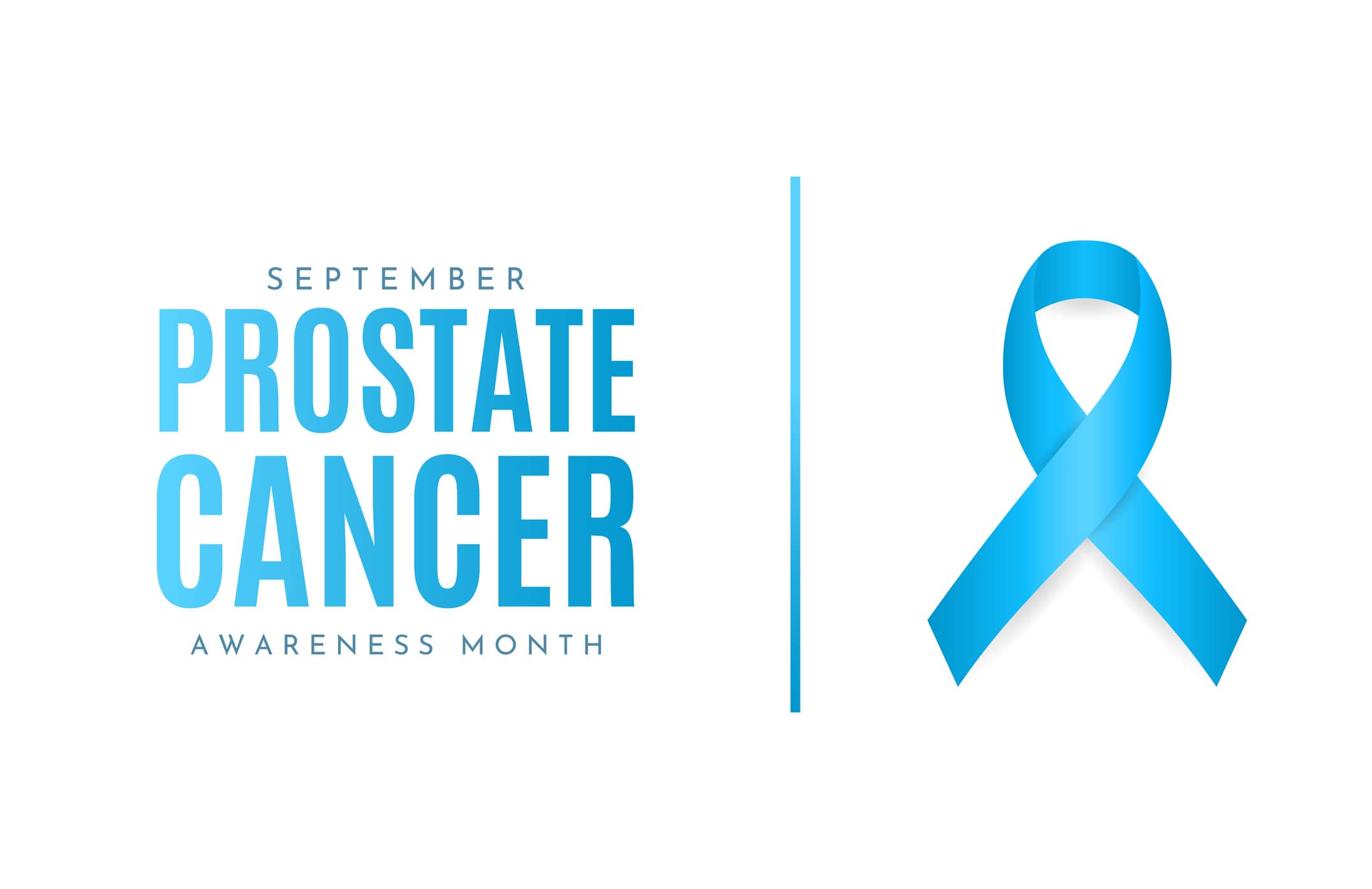-
Prostate Health Month
Prostate Cancer Awareness Month

September is Prostate Cancer Awareness Month. Why is awareness of prostate health so important? It is important to understand how prevention, early detection, and treatment can help improve the survival rate of this disease, which is currently the second leading cause of cancer death for men in the United States. According to the latest data, more than 288,000 men in the United States are diagnosed each year, and nearly 35,000 of them die. Understanding the warning signs and risks is vital, and so is being proactive about screening, especially if you are in a high risk group.
Understanding Your Risks
All men are at risk for prostate cancer, but some groups are at a higher risk than others. People of African ancestry have a 70 percent higher risk than other groups, and older men are at a higher risk than younger men. A family history of cancer increases your risk, and it is not just prostate cancer in a male relative. The risk is also increased by a family history of breast cancer, particularly in a sister or mother. While these factors cannot be modified, there are certain risk factors that can be changed, like smoking and a sedentary lifestyle.
Screening for Prostate Cancer
With early detection, the odds of surviving prostate cancer are high. Warning signs for this disease include difficulty with urination and sometimes pain in the hips or back. However, many people with prostate cancer experience no symptoms, but are diagnosed after a biopsy is ordered because of an abnormal blood test. This blood test, screening for a marker called prostate-specific antigen (PSA). There is evidence that regular PSA screening can reduce mortality from prostate cancer. It is recommended that men begin getting screened for prostate cancer at age 50, or at 45 if they are in a higher than average risk category.
Treating Prostate Cancer
Fortunately, there are effective treatments for prostate cancer, particularly if it is caught early, when it is still confined to the prostate. Surgery and some forms of radiation are used to treat prostate cancer, and for aggressive prostate cancer, additional therapies area used. These therapies include those that target hormonal pathways, as well as chemotherapy, immunotherapy, and radiopharmaceutical therapies. Many new therapies have been developed over the past decade, and more are in the works.
Decreasing Your Prostate Cancer Risk
There are certain lifestyle modifications you can make to lower your risk of developing prostate cancer.
- Stop smoking. Smoking and using tobacco are bad for every part of your body, and they increase the risk of prostate cancer.
- Eat a nutritious diet. Aim for five servings of fruits and vegetables each day, focusing on eating colorful produce. Choose whole grains, and limit your consumption of red meat and processed meats, instead choosing fish, skinless poultry, beans, and eggs as your protein sources. Eat healthful fats like olive oil, avocados, and nuts. Limit your sugar intake, and cut down on salt.
- Get regular exercise. There is extensive research to indicate that staying active reduces the risk not only of prostate cancer but also heart disease, stroke, and certain other cancers.
- Ask your doctor about screenings. Particularly if you feel that you fall into a high-risk category, it is important to be proactive.
Trust Center for Vasectomy Reversal for Help Maintaining Your Reproductive Health
At the Center for Vasectomy Reversal, we pride ourselves on helping men improve their fertility through uncompromising, concierge-level patient care. Under the direction of Dr. Joshua Green, our team provides state-of-the-art treatment for men who need a reversal of their vasectomy or have other fertility concerns. To learn more about the work we do or our discounts for active duty military and veterans, contact us through our website or call 941-894-6428.
-
Prostate Health Month

Prostate Cancer Awareness
September is Prostate Cancer Awareness Month
About one in 9 men in the United States will be diagnosed with prostate cancer during his lifetime, making it the second most common cancer, after skin cancer. Like many cancers, though, it can be treated successfully if detected early. In September, Prostate Cancer Awareness Month, and November, Men’s Health Awareness Month, we want to spread awareness to help men take better care of their health.
Prostate Screenings are Important
Men often get a little bit nervous about prostate exams, because the doctor must perform a digital rectal exam (DRE). This involves inserting a gloved finger into the rectum to feel the prostate’s surface, as well as examining the lower rectum and assessing the function of the anal sphincter. These exams are necessary, though, and people assigned male at birth should start having them around age 45 or 50, depending on their level of risk. In addition to the DRE, a prostate screening involves a PSA blood test, which measures the level of prostate-specific antigen in the blood.
What to Expect from a Prostate Exam
You don’t have to do much to prepare before a prostate exam, but you should let your doctor know if you have any issues like hemorrhoids, anal tears, or anal fissures. You’ll also need to abstain from sex for 48 hours before the exam, because ejaculation can cause your PSA levels to temporarily increase, and this can affect the test results. You don’t need to change your bathroom habits or be nervous if you haven’t defecated, because your doctor is used to this type of exam.
Doctors perform the two different types of screenings because, while a PSA blood test is very effective for detecting prostate cancer, the DRE can find cancer in people with normal PSA levels. During the DRE, your doctor will feel for lumps and bumps on the back portion of the prostate, where many cancers start. This exam only takes a few seconds, and while it may be uncomfortable, it’s not usually painful. The PSA is just a simple blood draw, sent to the lab for analysis. It only takes about a day to get the results, and if the PSA level is high, you may need further testing to diagnose prostate cancer, like a prostate biopsy, MRI, or other lab tests.
A Healthy Lifestyle can Help Protect Your Prostate
Prostate screenings are important for protecting your prostate health, because prostate cancer doesn’t always cause symptoms. They’re not the only measure you can take to keep your prostate healthy. Following these healthy living tips will help not only with your prostate health, but also with your overall well-being.
- Watch your weight. Prostate cancer is just one of the many health issues linked to obesity.
- Eat your veggies. Vegetables, especially dark, leafy greens, are important for prostate health. The vitamins and minerals found in foods like Romaine lettuce, spinach, kale, and broccoli are vital for a healthy prostate.
- Cut back on red meat. Heavy consumption of red meat can increase your risk of prostate cancer, but eating it on special occasions only will reduce your risk.
- Understand your risk. Talk to your doctor about your risk level; high risk groups include African Americans, those of Scandinavian descent, and people with a family history of prostate cancer.
- Get regular exercise. Exercising for 30 minutes a day at a moderate pace can have a preventive effect on many health issues, including prostate health.
- Drink plenty of water. The recommended amount of water for proper hydration is at least eight cups of water daily, and more if it’s hot or you’re very active.
- Manage your stress. Long-term stress weakens the immune system and alters your hormonal balance, increasing your risk of disease. Strategies like mindfulness and meditation can help with stress management.
- Don’t smoke. Smoking causes carbon monoxide to attack your red blood cells, increasing your risk of prostate cancer and other diseases. If you are having trouble quitting, talk to your doctor.
Center for Vasectomy Reversal Cares About Men’s Health
At the Center for Vasectomy Reversal, men’s health is our priority. We pride ourselves on helping men improve their health and fertility through uncompromising, concierge-level patient care. Under the direction of Dr. Joshua Green, our team provides state-of-the-art treatment for men who need a reversal of their vasectomy or have other fertility concerns. To learn more, contact us through our website or call 941-894-6428.
-
Debunking the Myth About Vasectomy Reversals and Prostate Cancer

If you have been considering a vasectomy reversal, then there is a chance you may have encountered a persistent myth regarding vasectomies, reversals, and prostate cancer. Although it is true that some studies in the past have linked vasectomies to higher risks of prostate cancer, newer research has resoundingly confirmed that this is not the case for either vasectomies or vasectomy reversal surgeries.
This myth has remained around since the studies first surfaced in the early 1990s. However, research has since dispelled this myth. Having a vasectomy—or having a vasectomy reversal—has no impact on your risk of developing prostate cancer. Your vasectomy reversal surgeon can address any concerns you have about this myth during your procedure consultation.
If you’re wondering if you could be a candidate for vasectomy reversal surgery, make an appointment at the Center for Vasectomy Reversal. Dr. Green in Sarasota is pleased to answer all of your questions about the surgery, from what to expect as you heal to your odds of conceiving after the reversal. To learn more, please call (941) 894-6428.
Recent Posts
Popular Posts
categories
- Uncategorized
- Sperm Retrieval
- vasectomy reversal
- Emergency
- Dr. Green
- sperm count
- fertility
- male infertility
- MESA
- medical care
- low sperm count
- IVF
- male fertility testing
- anesthesia
- pregnancy
- sperm aspiration
- semen analysis
- post-vasectomy pain syndrome
- infertility
- VE
- anti-sperm antibodies
- older dad
- general anesthesia
- gender reveal party
- post-operative infections
- baby name
- parent
- baby's first year
- fertilization process
- spinal anesthesia
- ACS Fellow
- nutrition tips
- concierge-level care
- fertility planning app
- azoospermia
- out-of-town patients
- V-V
- post-vasectomy reversal
- conceiving
- vasectomy
- vasoepididymostomy
- smoking
- sperm quality
- baby registry
- infographic
- surgical care
- surgical consultation process
- prostate cancer
- baby gender
- family time
- COVID
- Baby Shower
- Child Care
- Halloween Costume Ideas for Babies
- Halloween
- Halloween Safety Tips
- Celebrity Infertility Spotlight
- Postpartum
- testosterone
- Father's Day
- Father
- Men's Health
- Thanksgiving
- Pregnancy Announcement
- Parenting Tips
- Sperm
